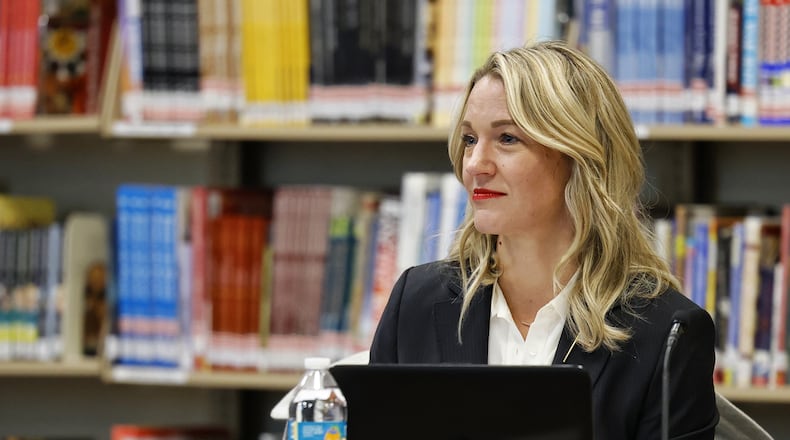Boddy, however, criticized the censure petition, describing it as non-representative of the majority of Lakota school parents and residents, many of whom, she claims, support her politically conservative agenda and her actions since joining the board in January.
Efforts to have her censured is a local example, Boddy said, of politically motivated cancel culture.
The petition is the work of a group — Stand For Lakota — created just days after Boddy was sworn on to the board in January.
Despite repeated solicitations over the last week by the Journal-News, representatives for Stand For Lakota, which notes on its Facebook page a membership of 318, has declined to comment.
But Brad Lovell, a recently departed Lakota school board who chose not to seek re-election last fall, said the petition reflects a growing number of those in the school system who object to Boddy’s actions and comments during board meetings.
“Meeting after meeting I have watched Ms. Boddy question and challenge Mr. Miller’s leadership. Through board action she has attempted to strip Mr. Miller of his ability to do the job he was hired to do as the leader of the district,” said Lovell, who is a Lakota school parent a signee of the petition.
“Mr. Miller has worked relentlessly since he has been here to develop a deep trust in our community and build a common vision …. He has shown time and again his commitment to our students, staff and community. To be attacked and have his character questioned by Ms. Boddy is unacceptable ….”
The online petition includes allegations against Boddy that she has verbally attacked Lakota Superintendent Miller on a variety of topics, mostly frequently regarding the issue of Critical Race Theory (CRT).
Miller and other district officials have long-contended Lakota does not teach CRT lessons to students.
Boddy has stated during school board meetings that Miller cannot be considered impartial concerning the district’s curricula and the topic of CRT.
“Mrs. Boddy has repeatedly attacked the integrity and honesty of Mr Miller,” states the online petition.
“She continues to use rhetoric and hearsay to launch baseless attacks upon Mr. Millers ability to serve in his capacity. She has directly attacked his impartiality in reviewing concerns regarding curriculum, questioned his honesty with comments implying he is ‘hiding things’ in regard to curriculum and classroom activities and repeated unfounded statements about questionable materials being used in the classrooms by Lakota teachers,” said petition organizers.
“Mrs. Boddy’s statements and behavior serve to undermine the confidence in district leadership at the board level. Additionally, by her words and statements she is demeaning the integrity of the entire Lakota staff.”
“This behavior must not be tolerated and should not be allowed to continue. We are demanding action be taken to call out this behavior as entirely inappropriate.”
As of Monday afternoon, 423 people appear to have signed the petition since it was posted March 28, according to website’s running tally.
There are 17,000 students in Lakota Schools.
To censure means to find fault with and criticize as blameworthy and differs from censor, which is an effort to interfere with someone’s communications.
Boddy countered the claims of petition organizers, saying: “Parents across the country, not just Lakota, have made it very clear that they want critical race theory removed from their schools.”
“I’m being attacked by the left because I’m standing up for these parents, which shouldn’t surprise anyone because that was my campaign pledge.
“As far as trying to have me censored, to do that someone is going to have to get more specific. It has not been my experience that the (political) Left argues from a rational perspective, they seem to prefer personal destruction and cancel culture,” Boddy told the Journal-News.
“It will be very interesting to see if someone on this board wants to take this ball and run with it,” she said.
Ohio School Board Association (OSBA) Chief Legal Counsel Sara Clark said a school board’s attempt at censuring a member is not the same as a recall effort to try to remove someone from the publicly elected office.
And a school board’s moving to censure a member is rare among Ohio’s 613-plus school boards.
“A censure typically comes in the form of a formal resolution that is adopted by the board,” said Clark.
“If the resolution passes, the censure does not remove the board member from office, nor does it impede the board member’s ability to act as an elected official. Instead, a censure serves as a board’s expression of displeasure or disapproval of the conduct of one of its members and is usually used as an attempt to ensure the board member’s compliance with board policies, rules and codes of conduct,” she said.
About the Author

